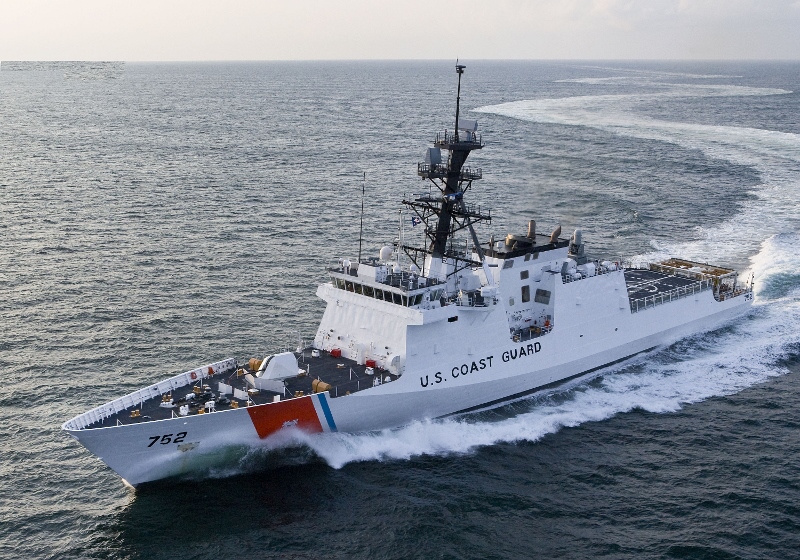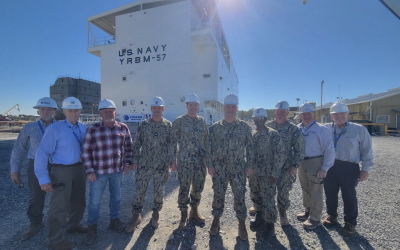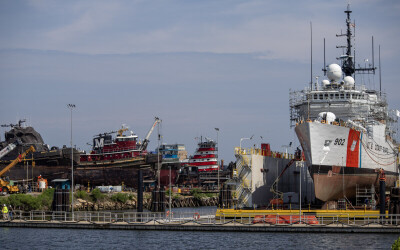The Coast Guard could take a 14% hit to its budget and lose the ninth ship planned for its National Security Cutter (NSC) class under the Trump administration’s proposal to fund a $54 billion increase in the other military services.
The White House Office of Management and Budget has proposed cutting Coast Guard spending by $1.3 billion and targeting ship construction for $500 million — the obvious target being the next 418’x54’22.5 NSC to be built at Huntington Ingalls Shipbuilding, Pascagoula, Miss. That would be a 14% cut in overall spending by the service, Politico reported, citing internal budget documents.
“The impact of OMB’s direction to the Coast Guard is unknown at this time,” Ingalls spokesman Bill Glenn said in a terse statement issued to news media. "We have already purchased long lead materials and have begun pre-construction.”
Sen. Thad Cochran, R-Miss., got $640 million attached to a December 2015 spending bill to pay for the cutter, arguing the NSCs have proven their worth in combatting drug cartels and human traffickers.
It is early in the budget process, and Trump proposals are facing tough scrutiny from Democratic critics and Republican fiscal conservatives alike. The Coast Guard budget proposal elicited immediate pushback from lawmakers.
Rep. Duncan Hunter, R-Calif., chairman of the House Subcommittee on Coast Guard and Maritime Transportation, urged President Trump to engage with OMB on the Coast Guard recommendation, warning it conflicts with Trump’s own policy priorities.
“It’s nonsensical to pursue a policy of rebuilding the armed forces while proposing large reductions to the U.S. Coast Guard budget,” Hunter wrote in a March 2 letter to the White House.
The Coast Guard is instrumental to the administration’s goals of border control and drug interdiction, Hunter wrote, noting that the Coast Guard seizes more cocaine at sea than what is captured at ports of entry and by all other domestic law enforcement agencies.
The NSCs play a notable role in that high seas mission, patrolling the eastern Pacific in joint law enforcement operations to detect smugglers moving cocaine by speedboats and semisubmersibles.
“The termination of this contract is especially disconcerting when considered alongside the operational successes these assets have demonstrated, not to mention the hundreds of high paying American jobs that would be lost,” Hunter added.
The administration is proposing the $54 billion increase for military spending come from cuts to other parts of the federal budget — a strategy facing fierce opposition from the Democratic minority in Congress. Trump also faces fiscal conservatives in the Republican majority, whose members struck deficit reduction agreements with the Obama administration to mutually crimp military and domestic spending since 2011.
The OMB recommendations came days after the Coast Guard awarded $20 million in contracts for design studies and analysis for planning a new heavy polar icebreaker, the first in a class of three ships to be built by the mid-2020s.
The Coast Guard now has just one heavy icebreaker, the 399’x83’x31’ Polar Star that recently deployed to Antarctica to resupply the U.S. McMurdo station. Its 40-year-old sister ship Polar Sea is tied up, deemed too expensive to renovate and now a spare parts bank for the Polar Star.
There is bipartisan support in Congress for new icebreakers, not least because of Russia’s Arctic fleet of 40 ships. The prospect of Coast Guard budget cuts is alarming conservatives worried about Russian competition in the high latitudes.





